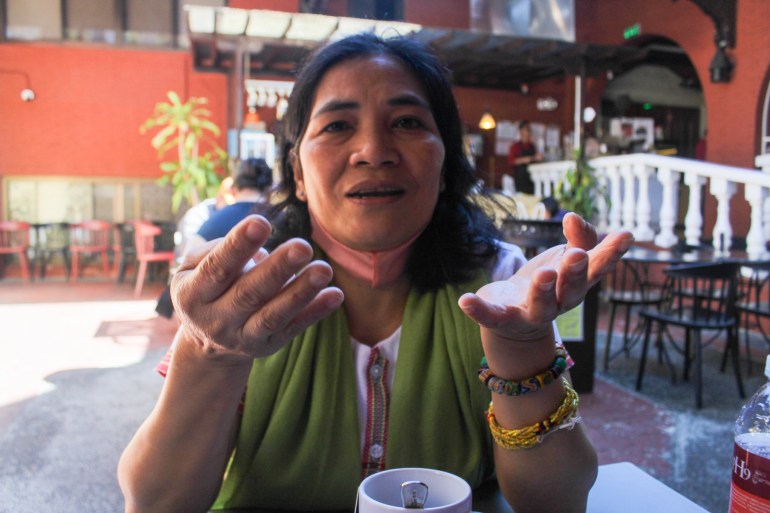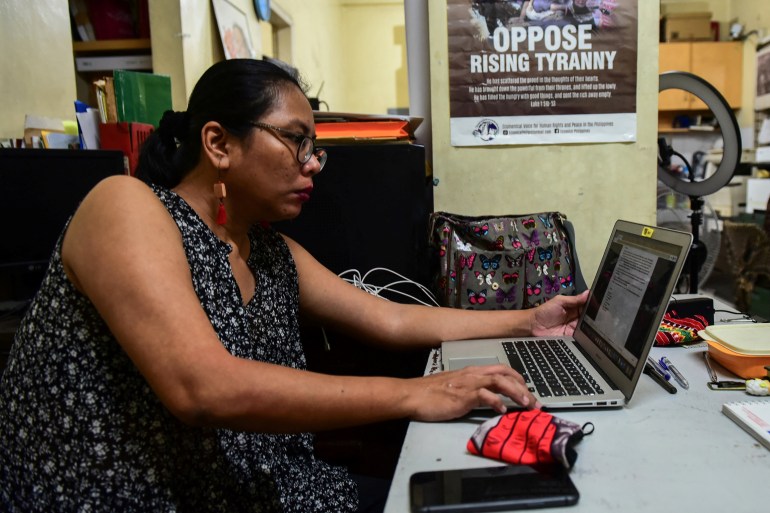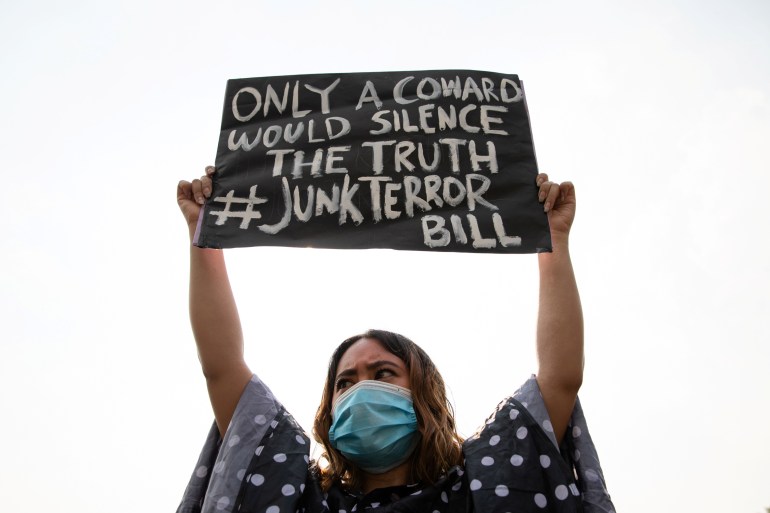Baguio, Philippines – In an unlit bathroom, Diaper Bolinget gently pours a bucket of water over his head, making sure to minimize the splashing noise on the tile floor.
The 49-year-old is a well-known activist leader in the mountainous Cordillera region of the northern Philippines and spends most of his life between several unknown refuges.
Bolinget tries to remain invisible indoors, only leaving the room when absolutely necessary and avoiding any noise that might attract attention.
“I have normal routines with extraordinary effort,” he said.
On the rare occasions he spends time with his family in his own home, he follows the same protocol.
Whether Bolinget is there or not, his wife and four children wake up at night when one of their six dogs barks. They monitor surveillance cameras and take to the streets because they fear armed men might be after him. Surrounding households are doing the same, knowing that the man they have called a friend for decades has been branded a “terrorist” by the Philippine government, which wants him behind bars.
“We need to be able to smell danger, have emergency contacts ready and recognize if we are being tailed in a public place,” he said.
Bolinget is chairman of the Cordillera Peoples Alliance (CPA), an activist coalition of indigenous peoples. He and three other CPA leaders, Jennifer Awingan-Taggaoa, Steve Tauli and Sarah Abellon-Alikes, were designated “terrorists” by the Anti-Terrorism Council (ATC) on July 10, 2023.
Citing “probable cause” of involvement in “organized violence,” the ATC, led by law enforcement officials, alleges that the CPA and the four individuals are part of the country’s long-running communist armed insurgency.
Under the Anti-Terrorism Law (ATL) of 2020, authorities can arrest people identified as “terrorists” without a warrant, restrict travel, freeze assets, conduct surveillance, and issue new court orders to restrict their movements without giving reasons. Some people previously considered “terrorists,” communists or enemies of the state were later found dead. Some 89 extrajudicial killings of activists have taken place since June 2022, when Ferdinand Marcos Jr. became president.
According to human rights group Karapatan, 51 people are currently considered “terrorists.”
The designation represents a step forward from the more common red-tagging, in which activists are linked to armed rebellion to justify action. In the past, all four CPA leaders have faced allegations related to their alleged involvement with rebels. All of this, including a shoot order against Bolinget, was dismissed in court.
Critics have described the ATL as the reimposition of martial law in the Philippines.
For the past nine months, aside from the court hearings challenging the ATC decision, CPA leaders have lived in relative isolation.
“We want to prove the facts and question the basis of the designation,” said Baguio city councilor Jose Molintas, lawyer for the four suspected “terrorists.”
Karapatan’s Cristina Palabay said the law “institutionalizes the ATC’s mandate to act as judge and jury in implementing its draconian crackdown. “It not only threatens and harasses activists, but also puts their lives at risk.”
Life in terror
The Bolinget and Taggaoa families were branded terrorists on social media as early as 2020.
Images of her children, some of whom are under 18, have been paraded by trolls and even police as the offspring of “terrorists.” Taggaoa’s daughter Kara, a labor rights activist in Manila, was also arrested in 2022 for a robbery that allegedly took place during a demonstration.

Joel Egco, spokesman for the National Task Force to End Local Communist Armed Conflict, warned dissenters earlier this year: “Before we accuse you (of terrorism), surrender now!”
In such an atmosphere, CPA leaders live in constant fear for the safety of their families. Bolinget says some friends and relatives have cut off contact with them because they fear that associating with them could be viewed as a crime.
“I am an enemy of the state, an open target. The state wants to isolate me from the family, it’s easier for them,” he said.
Bolinget led one of the 37 Supreme Court petitions against the ATL in 2020, highlighting possible human rights violations.
“All our fears have come true and I have become living proof that being classified as a terrorist will be treated worse than a criminal,” he said.
The designation also affects their health. Bolinget and Taggaoa suffer from stomach problems more often and have to convince their doctors to see them at inconvenient times.
Taggaoa feels “so sick all the time. The doctors said it was stress-related.”
Bolinget blames lack of sleep for his poor health. “One half of your brain is always awake and alert. “I’m always nervous, like my temper is going to boil at any moment,” he said.
Constant alarm
When Taggaoa was arrested in January 2023, she wasn’t worried. She, Bolinget and five others were charged with rebellion after allegedly taking part in an armed raid.
“I knew straight away it was fake and I was able to prove it in court,” she told Al Jazeera. The proceedings were discontinued in May of this year. But a few months later she learned she had been named by the ATC when the decision was published in a national newspaper.
Taggaoa spent the next four months bouncing between hiding places, reminding her family at home to lock all doors and stay vigilant.
In January, Marcos Jr. said he wanted to quickly remove the Philippines from the “gray list” of the Financial Action Task Force (FATF), a global money laundering and terrorist financing watchdog.
To this end, Marcos announced accelerated “action plans to combat money laundering and terrorist financing and to file cases against violators.”
Living without access to personal and business funds was particularly challenging as Taggaoa had to give up her small general store.

Taggaoa’s husband, a university professor, also had his accounts frozen, leaving him unable to make car loan payments and having to make special arrangements to receive his salary.
Taggaoa believes the designation is a new tactic aimed at neutralizing opponents after other methods have failed.
“They harass you and pressure you to side with the government. And if you refuse, they will eventually call you a terrorist,” Taggaoa said.
Throughout 2022, military officers attempted to persuade Taggaoa and her relatives to “cooperate” with them.
When her teenage nephew came home from school, he was even attacked by soldiers who, she says, pressured him to steal Taggaoa’s files and flash drives.
Confusion in the courtroom
Legal challenges also proved difficult.
When the four appealed directly to the ATC to remove the designation in August 2023, it was immediately rejected without a hearing.
“The ATC relies solely on unconfirmed intelligence reports. It merely accepts them as true and immediately issues designations, which is a violation of due process,” said Molintas, legal counsel for the four. As he spoke to Al Jazeera, posters of him were put up on the city’s streets, also calling him a “terrorist.”
Justice Department spokesman Attorney Mico Clavano defended the designation process, saying the ATL allows it to be a purely “executive act” without judicial involvement.
According to Molintas, therein lies the danger.
“A person should be presumed innocent and not guilty before their court date,” he said. “A terrorism charge is different from regular red-tagging charges because it deprives you of your right to due process.”
After the appeal was rejected, Molintas turned his attention to revoking the ATL and designation to the Regional Trial Court (RTC) in November 2023. Since then, the lawyer has accused the government of repeatedly trying to derail its efforts.
At three of the RTC hearings, armed men in plain clothes were seen in the courtroom. They were later identified as active-duty soldiers.

The Office of the Attorney General (OSG) argues that even if the court rules in favor of the four, they would still be considered “terrorists” outside the Cordillera because the RTC presides over “only part of the country.”
Some lawyers disagree.
“The OSG is wrong,” said Ephraim Cortez of the National Union of Peoples’ Lawyers. He contends that the RTC lawsuit applies nationwide because it invokes constitutional powers to find “serious abuses” in government decisions.
The RTC has scheduled another round of hearings for April 25.
Meanwhile, Taggaoa rarely leaves the house unless absolutely necessary. Her collaborative research and her role as a parent are severely compromised, and she fears the same fate for her children.
“I think my life will be like this until our case is resolved,” she said, but while the “terrorism designation” took its toll on her family, there was an unexpected benefit.
“We protect each other and it has brought us closer,” she said.
